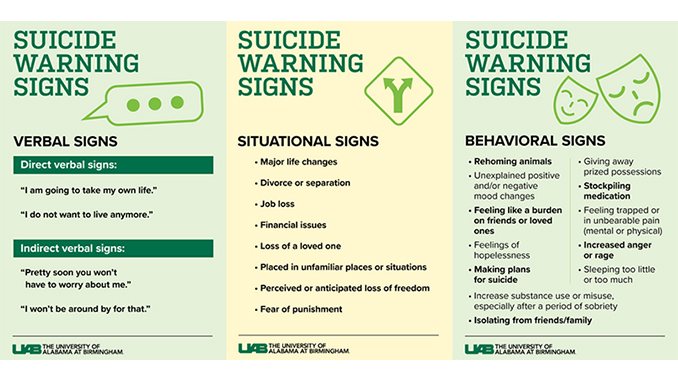
Question, Persuade, Refer - QPR uses evidenced-based training to teach the everyday person how to recognize if someone is in crisis.
Published: October 7, 2023
By: Hannah Echols
Author Website: Click to Visit
CPR is one of the most recognizable initialisms in health care. It is a first aid skill that saves numerous lives every year. There is another acronym, however, that can also save lives, not from heart attacks or strokes, but from suicide.
Mental health advocates created QPR — question, persuade and refer — which uses evidence-based training to teach the everyday person how to recognize whether someone is in crisis. Angela Sullivan, Ph.D., board president of the Alabama Suicide Prevention and Resources Coalition and assistant professor in the University of Alabama at Birmingham School of Public Health, breaks down QPR and how individuals can use it to help others.
Recognize the signs
Before QPR can start, Sullivan says, people first need to understand the verbal, situational and behavioral signs of suicide.
Verbal cues can be direct or indirect. While it is easy to spot direct cues, such as someone specifically saying they want to take their own life, the indirect cues may not be as obvious.
“Indirect verbal cues could sound like ‘Pretty soon you won’t have to worry about me’ or ‘I won’t be around for that,’” Sullivan says. “These may be more subtle but are as important as direct cues. If you hear these cues, it is a good time to encourage the person to further explain what they mean.”
Situational and behavioral signs can also range from obvious to more subtle in nature. Sullivan notes that it is important to understand other people’s perspectives when looking for signs as they can present differently depending on who the person is, how old they are, their situation, etc.
For instance, situational signs can stem from major life changes. A major life change for an adult might include job loss, divorce or sudden financial hardships. For someone younger, situational signs can be transitioning from one school to another. Perceived or anticipated loss of freedom, fear of punishment and loss of a loved one are other common situational cues.
Behavioral signs can include rehoming pets, giving away prized possessions, increased substance use, and sleeping too much or too little. Other feelings such as feeling like a burden to friends and family, feeling trapped or hopeless, and increased anger or rage are additional behavioral signs.
“It is important to remember that signs manifest in different ways depending on the person’s perspective,” Sullivan says. “Not all signs will be bright red flags; sometimes they are subtle orange.”

Question
Once verbal, behavioral and/or situational signs are identified, it is time to question. Sullivan emphasizes that it is important for people not to hesitate and to be direct when asking questions.
Examples she suggests include:
- “I am worried about you because of these reasons ….”
- “Are you OK?”
- “Are you thinking about killing yourself?”
Sullivan also cautions to be mindful of the phrasing of questions.
- At UAB, students can access care via Student Counseling Services, while employees are encouraged to seek help through Employee Assistance and Counseling Center.
- In Birmingham, contacting the Crisis Center is a first step for any person in immediate suffering. Its 24-hour hotline can be accessed at 205-323-7777.
- Nationally, the National Suicide Prevention Lifeline is a valuable resource for any person in need. Its 24-hour hotline can be accessed at 988, like 911, but for suicide and mental health crises.
- Text “HOME” to the National Crisis Text Line at 741741 to be connected to a crisis counselor at any time day or night. UAB community members can text “UAB” to 741741 for crisis support as well.
“Questions such as ‘You’re not going to kill yourself, are you?’ automatically implies that you want them to say no,” Sullivan says. “This may discourage them from being honest with you.”
Persuade
In QPR, persuading has less to do with bargaining and more with listening. It is a time to acknowledge the other person’s hopelessness and hurt and to actively listen.
Persuading someone to live may also look like creating action plans of friends and family members to reach out to, listing activities to get them out of crisis moments and into appreciating their favorite hobbies.
Sullivan suggests using phrases such as “I want you to live” and “Are you willing to let me help you get help?” during this phase. It is also a time to ask them to share reasons for why they would like to keep living.
Refer
Many people have suicidal ideation for months or even years. However, data shows that the average timing for those who go from ideation to action ranges from five minutes to two to three days.
Once someone has identified a person in a crisis, it is time to get help. Crises do not always happen during an 8-to-5 workday. However, there are suicide and crisis resources available 24/7.
- At UAB, students can access care via Student Counseling Services, while employees are encouraged to seek help through Employee Assistance and Counseling Center.
- In Birmingham, contacting the Crisis Center is a first step for any person in immediate suffering. Its 24-hour hotline can be accessed at 205-323-7777.
- Nationally, the National Suicide Prevention Lifeline is a valuable resource for any person in need. It houses tremendous resources for those considering suicide as their only option, but also for the general public who may be curious about how to help a friend. Its 24-hour hotline can be accessed at 988.
- Text “HOME” to the National Crisis Text Line at 741741 to be connected to a crisis counselor at any time day or night. UAB community members can text “UAB” to 741741 for crisis support as well.
Sullivan says calling 988 is a good option if someone is with a person in immediate danger. Additionally, once the call is made, without putting oneself in danger, it is beneficial to stay with the person at risk until they are connected to help.
“Our goal with QPR training is to get as many people as possible well-versed in the signs and know how to take actionable steps,” Sullivan says. “Suicide prevention is everybody’s business, and QPR Gatekeeper Training is designed for everyone to feel confident that they can help out during a crisis.”
The UAB Cares Suicide Prevention Initiative offers QPR training to faculty and staff through Student Counseling Services, the Center for Teaching and Learning, and the EACC. Completing QPR training is one step toward becoming a Mental Health Advocate Level One and earning a badge that can be used to showcase one’s commitment toward supporting mental health at UAB.
